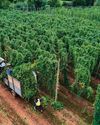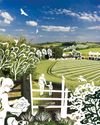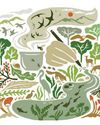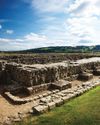
For more than 30 years from the mid-1960s, BBC storytelling programme Jackanory featured the stars of the day, from Kenneth Williams to Bernard Cribbins, reading stories aloud - with the counterintuitive aim of encouraging young viewers to actually stop watching those square TVs and pick up a book instead.
Now, almost 30 years later, the spirit of the series lives on in BBC Four's The Read, this time reimagined to introduce adults to iconic British novels. Sam Selvon's The Lonely Londoners, Bruce Chatwin's On The Black Hill and Louise Levine's A Vision of Loveliness have all been given this fresh treatment and now it's the turn of Barry Hines' seminal work A Kestrel for a Knave.
Filmed at Oldham Colliseum Theatre, Christopher Eccleston is the narrator and he himself acknowledges the impact Hines' coming-of-age novel has had on him.
"If I hadn't met Barry Hines' Billy Casper from the extraordinarily beautiful novel A Kestrel For a Knave, I would have cared less about other people and I would not be an actor," he said.
It's easy to see why this book, first published in 1968, has such a profound effect on those who encounter it. Billy Casper's life in a South Yorkshire mining village is bleak; he is ridiculed and bullied at home and at school. The calming open fields of a nearby farm represent the blessed relief from his life's difficulties and the freedom Billy feels when connecting with his beloved kestrel, Kes.
Esta historia es de la edición September 2023 de BBC Countryfile Magazine.
Comience su prueba gratuita de Magzter GOLD de 7 días para acceder a miles de historias premium seleccionadas y a más de 9,000 revistas y periódicos.
Ya eres suscriptor ? Conectar
Esta historia es de la edición September 2023 de BBC Countryfile Magazine.
Comience su prueba gratuita de Magzter GOLD de 7 días para acceder a miles de historias premium seleccionadas y a más de 9,000 revistas y periódicos.
Ya eres suscriptor? Conectar

TOP 10 REMOTE PLACES IN THE UK
There's something aweinspiring about a place that's remained untamed. Dixe Wills picks his favourite wild sites

Pub closures and fewer hops leave UK brewers in a fight for survival
Fancy a pint?

Will a new national trail provide better access to nature?
Before sitting down to write this I went for a brisk walk along a public footpath at the edge of my village and felt much better for it.

BRITAIN'S 'ROYAL FISH' ON THE BRINK OF EXTINCTION
Urgent conservation action is required if we're to save the sturgeon from disappearing from UK waters, say experts

STRATEGIC TREE PLANTING TAKES ROOT
New agroforestry guide helps farmers meet environmental goals

Coalition of the willing
Growing a rainforest takes time, ingenuity and passion.Oh, and a bit of dragon skin. Danny Graham meets the people fighting to save Scotland's rare habitats

Noticing nature daily can help us understand ourselves and the world
For over 120 years, The Guardian's Country Diary has delivered a daily portrait of an intimate view of the countryside (or nature, wherever we find it) from across Britain.

“WITCHES MARKS’ FOUND AT MEDIEVAL MANOR HOUSE
The staggering” number of carved rituals elevates 15th-century Gainsborough Old Hall to one of Britain’s spookiest buildings

Poison on your pooch?
You want to protect your dog from fleas and ticks, but the treatments may be contaminating our rivers, say scientists. James Fair looks at the best ways to fight parasites, for both pets and planet

RARE ROMAN KNIFE HANDLE DISCOVERED AT HADRIAN’S WALL
Find in the River Tyne in Northumberland proves celebrity cult’ of gladiators, say experts